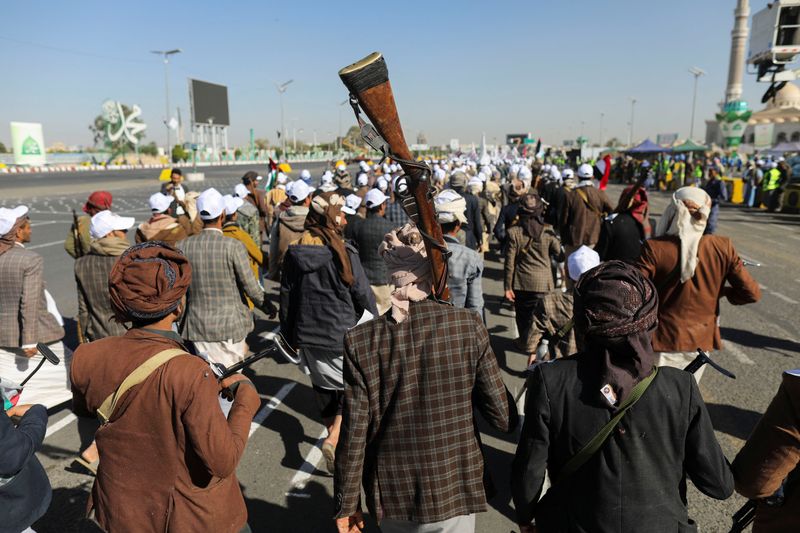By Jonathan Landay
WASHINGTON (Reuters) -In its latest response to attacks on shipping by the Houthis, the U.S. on Thursday sanctioned an individual and three currency exchange houses it accused of facilitating the flow of Iranian financial assistance to the Yemeni movement.
Two of the exchange houses are based in Yemen and one is in Turkey, the U.S. Treasury Department said in a statement announcing the new measures.
"Today's action underscores our resolve to restrict the illicit flow of funds to the Houthis, who continue to conduct dangerous attacks on international shipping and risk further destabilizing the region," Under Secretary of the Treasury for Terrorism and Financial Intelligence Brian Nelson said in the statement.
The sanctions freeze any U.S. assets belonging to the targeted entities and generally prohibit Americans from doing business with them.
The Houthis have seized or attacked with drones and missiles a dozen ships in the Red Sea and Gulf of Aden since Nov. 19. They aim to raise the international costs of Israel's offensive in Gaza, which was triggered by the Oct. 7 onslaught into Israel by the enclave's ruling Hamas militants.
U.S., British and French warships have shot down drones and missiles launched by the Houthis, who control huge swaths of Yemen captured during years of civil war. The Iran-aligned movement says it will continue the attacks in response to the Israeli assault on Gaza.
The U.S. is leading a new naval task force to protect commercial shipping and has accused Iran of supplying weapons, financing, targeting and other assistance to the Houthis. Iran denies the allegation.
The sanctions announced by the Treasury on Thursday were the latest aimed at throttling the flow of alleged Iranian financing to the Houthis.
The Treasury said the measures targeted a network through which an Iran-based financier, Said al-Jamal, who has been under U.S. sanctions since at least June 2021, provides Iranian funds to the Houthis.
Those hit included Al Aman Kargo Ithalat Ve Nakliyat Limited Sirketi, which the Treasury described as a "waypoint" for funding provided to the Houthis by Iran's Islamic Revolutionary Guards Corps.
Also targeted were Sanaa-based Nabco Money Exchange and Remittance Co, a recipient of funds sent by the Turkish entity, and its top official, Nabil Ali Ahmed al-Hadha, also president of the Currency Exchangers Association, the Treasury said.
Houthi-run Al Rawda Exchange and Money Transfers Co also was targeted for converting into Yemeni rials funds sent through Hadha's accounts in Turkey, it said.

A Nabco employee hung up the phone when called by Reuters for comment, and subsequent attempts to contact the company were unsuccessful.
Al Rawda did not immediately respond to an email requesting comment. Al Aman could not immediately be reached for comment.